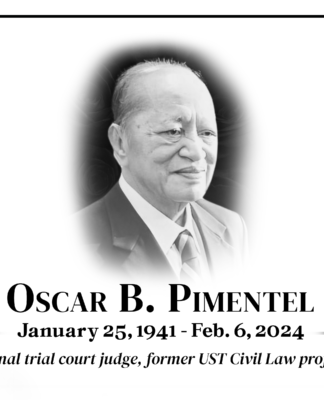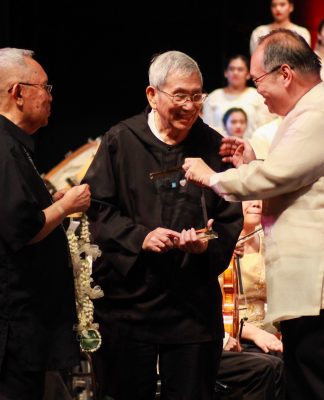UST RECTOR Fr. Ernesto Arceo OP expressed dissatisfaction over the recent elections which he believes were marred by fraud and violence.
“The nationwide phenomenon of vote-buying and selling despite numerous laws strictly prohibiting them is a great indicator that both the candidates and the voters lack moral ascendancy,” Arceo told the Varsitarian.
According to the latest Philippine National Police report, the campaign season death toll reached 126 as of May 23. An article in the Philippine Daily Inquirer last May 15 also reported rampant vote-buying and fraud all over the country, with prices ranging from P50 to P1,500 for every vote.
Arceo said that for a true democracy to work, two things are necessary— intelligent people and moral integrity. But, for him, the greater majority lacks these two basic requirements.
Arceo said he himself had witnessed vote-buying in his hometown in Pulilan, Bulacan and had heard of pervasive cheating in Bataan.
“When candidates try to buy someone’s votes, they are in a way insulting them,” he said. “It also signifies the weakness of the electorate and that they are inadequately informed on the value of their one vote.”
According to Arceo, vote-buying has been ingrained in the Filipino culture that rooting it out seems next to impossible. This is also one factor why poor but deserving candidates are denied of public office, he said.
Rebel country
For Arceo, the Genuine Opposition’s dominance in the senatorial election is a sign of dissatisfaction of the people with the administration of Presdident Macapagal-Arroyo.
“The fact that the ‘Hello Garci’ scandal has not been resolved and the name of the President has not been cleared made the people lose faith on the administration,” Arceo said.
He urged newly-elected officials to take this lack of faith as a challenge to prove to their constituents that they are worthy of their vote.
“More than making a big fuss out of the pork-barrel, congressmen and senators alike should be reminded that their main role is to legislate laws that are directed to the common good and to repeal the obsolete ones,” he said.
He also noted that although the pro-life party-list Buhay is leading the elections, it is still disturbing that more “anti-life” and “anti-family” legislators are entering the Congress. (see related article below, Buhay tops party-list election).
Committee on justice
But Arceo lauded the victory of Fr. Ed Panlilio in the Pampanga gubernatorial race. He explained that his move does not violate the separation of church and state. It is the priest and the people’s last resort after failing to find anyone from the laity who is willing and responsible enough to take hold of the position, he said. (see related article below, Rector admires Pampanga priest-governor).
“Candidates for public office, more importantly, should give good example to the electorate,” he said. “So, we should educate not only the electorate but also the future politicians in the person of today’s youth to adhere to the values of truth-telling and equality.”
Arceo said that this is the cause why he created a permanent advocacy group for honesty and justice that aims to mold the morality and honesty among Thomasians.
“We will begin by instilling in the minds of the Thomasians, especially freshmen, that cheating is a taboo in the University,” Arceo said.
The committee will be headed by the vice-rector for religious affairs and will be represented by other departments in the University. Although Arceo finds no feasible strategy to resolve the widespread poll fraud during elections, he believes that through proper education of the youth, incidents of fraud would be gradually eliminated.
“I want Thomasians to graduate with upright moral standards and apply this in their chosen fields,” he said.
The committee will begin the revision of the Student Handbook that will include stricter rules and sanctions on dishonesty and immoral practices in the campus.
“More than what we have now, it is far important to step back, look at the bigger picture and formulate long-term plans for the generations to come,” Arceo said.
PPCRV talks
“The lost of life, even just a single life, is an indicator that peace is still somewhat elusive in our electoral process,” Parish Pastoral Council for Responsible Voting (PPCRV) secretary general Clifford Sorita told the Varsitarian.
Sorita likewise assessed the way political candidates’ populist appeal was shunned in the recently concluded elections.
“I believe that the current voting pattern of the people brings a flicker of hope that change is not far behind,” Sorita said. “Go to Pampanga and you will see what I mean.”
Sorita also discussed PPCRV’s voters’ education module, “Pinoy Voters’ Academy, Ang Drama sa Likod ng Halalan.”
He said the module was designed to be process- and community-based. The emphasis was to create an avenue (at the grass-roots level) whereby a “dialectics of thought” could be achieved in choosing the right candidates for public office.
Through this manual, Sorita said the PPCRV deviated from the traditional spoon feeding approach of directly telling the voters the qualifications of rightful candidates to be elected. Instead, it is geared toward a more dialogical approach of facilitating community reflections in order to draw out from the people’s collective discussions the qualifications of worthy candidates based on their localized needs and worldviews.
“The success rate of the module is hard to measure at this time since a change of perspective is not achieved overnight,” Sorita said. “But the rate of volunteerism PPCRV had in the 2007 elections is a potent indicator of the success of this voters’ education initiative.”
















